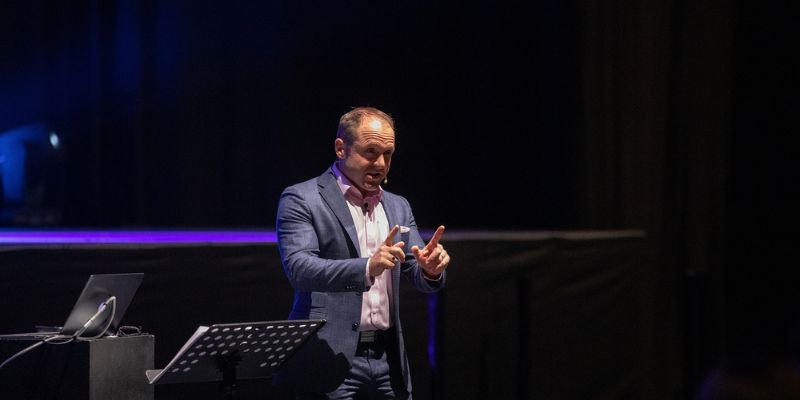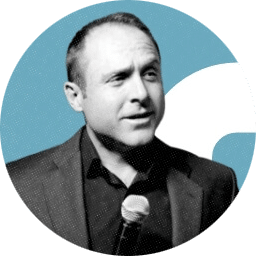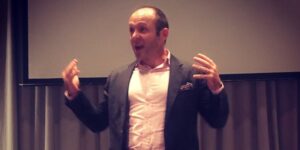Welcome to the Daily Podcast with Jonathan Doyle! In this episode, Jonathan explores how to overcome life’s challenges, drawing wisdom from Joseph Campbell and Friedrich Nietzsche. Join him as he uncovers the transformative power of reframing difficulties as opportunities for personal growth and resilience.
Welcome Aboard
Hey there, my friend, Jonathan Doyle with you once again. Welcome to the daily podcast. Thank you for joining me, please make sure you subscribe. Hit that big subscribe button, wherever you’re listening, if you like it. So we can get it to you every single day, five days a week. If I am not on a plane or on a surfboard or on a golf course, I am all yours. Check out the links because it will take you to the Instagram page @jdoylespeaks. If you’re on Instagram, you can find me there and hit me up with a DM. If you’ve got any questions or topics you want me to cover. You can find me on Instagram or you can send me a message through the website: jonathandoyle.co.
Friends, if you’re a regular listener, you may have listened to yesterday’s episode and go what happened to Jonathan? Cause I was quite reflective. I don’t know what it was cause I’ve been surfing this morning. And I’ve been training a fair bit and I’m hoping to run a marathon tomorrow. It’s Saturday here in the studio. I’m going to get up tomorrow, Sunday morning. And because I’ve got an ultra marathon coming up in nine weeks and I just want to get some Ks into the legs.
So I’m thinking of getting up tomorrow at 4:00 AM and knocking out a marathon and seeing how I feel. I got to church at 11, I ran that marathon early and just saw how it feels. So friends, if you need some encouragement at 50 years of age, And It’s amazing what the body can do. And so there’s some encouragement for you.
Life Reflections: Embracing Change and Acceptance

Yesterday, I talked about a quote from Joseph Campbell, which was about learning to be less rigid about how we plan our life and the rules that we have about expecting our life to be exactly the way we want it to be. And learning to accept the life that’s actually happening around us. And for me, it’s a question of kind of trusting that God is present in every moment of our life, even the most difficult circumstances. Today’s quote again from Joseph Campbell is going to take us a little deeper on that. Because it’s helping us say that even the most difficult things we face and let’s remind ourselves, this is essentially a motivational podcast, even the most difficult things we face. There is a way of inviting and opportunity.
Nietzsche's Philosophy: Finding Strength in Fate

So Campbell is going to begin here by quoting Friedrich Nietzsche. If you’re not familiar with Nietzsche, I’m a bit of a specialist in Nietzsche. My post-grad work was Friedrich Nietzsche, died of syphilis, went mad, had a phenomenal intellect, and was pretty dark. If you’ve ever heard the saying, what’s his famous one, whatever does not kill me makes me stronger, probably is the one most people know. God is dead and we have killed him, his other famous one, but there’s a much bigger context to that.
He’s actually pointing not so much towards atheism per se, but he’s actually pointing to what happens when a society that has constructed itself, a civilization, really, we think of the Western civilization. Constructed itself on the Judeo-Christian ethic. That quote from Nietzsche was actually him unpacking what happens when, as he says in the fuller quote, that comes from him, he says “We have unchained the earth from the sun. God is dead and we have killed him” And he goes on to talk about what those implications are going to be.
But let’s press into this quote from Campbell who references Nietzsche here. And it’s really interesting. So listen up, it says this, Nietzsche was the one who did the job for me. That’s Campbell talking about when he really understood Nietzsche. He said at a certain moment in Nietzsche’s life, the idea came to him of what he called the love of your fate.
“Whatever your fate is, whatever the hell happens, you say, This is what I need. It may look like a wreck, but as you go at it as though it were an opportunity, a challenge.”
If you bring love to that moment, not discouragement. You will find the strength is there. Any disaster you can survive is an improvement in your character, your stature and your life. What a privilege, this is when the spontaneity of your own nature will have a chance to flow.
Cultural Analysis: Reimagining Personal Growth

I liked the part where he says, whenever your fate is whatever the hell happens. You say, this is what I need. It may look like a wreck, but as you go through it, go at it as though it were an opportunity, a challenge. Let me give you a couple of thoughts on this. I’ve been saying for a long time, we live in an incredibly therapeutic culture. We pathologize virtually everything because of the impact of Marxism and cultural Marxism and our culture. Victim hood is central to the re-emergence of a kind of Marxist cultural narratives.
Many of us have been, either very directly or more subtly and indirectly impacted by the idea of everything being pathologized. Therapy is the answer to everything. We’re all victims in one way or another. Now I’m not trivializing the fact that some people have been deeply affected by trauma. But can we not agree that particularly through mainstream media, we see this kind of idea that everybody’s a victim.
That’s why this quote from Campbell and also what Nietzsche was getting is pretty revolutionary. Instead of immediately looking for someone to blame. Instead of constantly trying to get away from our pain. Constantly trying to drink it to submission, medicate into submission, exercise it into submission. What if the suffering and the difficulty and the pain was the point. What if as Nietzsche and Campbell are saying here, what does, if we could learn to say, this is exactly what I need. Isn’t this counter-cultural?
Embracing a Counter-Cultural Perspective

If you’re listening to this and cringing a bit, it’s because it’s really against this current cultural moment. Because this current cultural moment is all about consumption and pleasure. So late stage consumer capitalism is driven by consumption and pleasure. As Churchill said, capitalism is the worst system ever invented except for every other one, which has ever been tried. If you want to look at Joseph Stalin‘s attempt at an economy in the Ukraine in the 1930s, which killed multiple millions of people through starvation. The fact that I will say that late stage capitalism is driven by pleasure and consumption. Doesn’t mean that other systems are exponentially better, cause they’re not.
But can we not agree together that we do live in this moment where consumption and pleasure. And if we’re not happy, if we’re not enjoying life at all times, then something must be wrong and we must have mental illness or there must be something that’s happened to us. But this is a very counter-cultural message. Listen to it again, whatever your fate is, whatever the hell happens, you say, this is what I need.
Does that mess with you? I think that’s really going to mess with a few of us, it’s. Because the minute you get to that point. Do you know, the thing that instantly vanishes. You’re instantly no longer a victim. Because of the difficulty and suffering you face is a gift. As hard as it is. You’re instantly not a victim. You instantly become a dramatic actor in a much bigger story.
Personal Resilience: Overcoming Challenges

Without going into gory detail. Many of you would know if you’ve seen me live. Sometimes I talk in more detail about it. Let’s just say that the first 20 years of my life were less than ideal. On a scale of one to 10, one being really awesome, 10 being really not awesome. I was, I’d have to say, pretty much towards the 10.
As I get older and as I think about the challenges that I’ve had to overcome, I begin to think what if that was not meant to be, cause I don’t wanna say that, because that would get some of you thinking that I’m saying bad things happen to somebody that’s really good, because it’s going to help them. I don’t mean that. There’s mystery, it’s just mystery. Suffering is a mystery. Why do horrendous things happen? And why do horrendous crimes happen wire? Why do children suffer? There is a lot of mystery.
But what if for those of us listening today, as we face the little sufferings of our lives or perhaps the big sufferings of our lives. What if Nietzsche was right, because he was diabolical on a lot of other stuff. But whatever doesn’t kill me, makes me stronger. You have an opportunity to choose different responses, to develop different competencies, to access different resources.
I know a lot of people when they give up substance addictions, they’re suddenly confronted with coping with reality in a whole bunch of different ways. They have to find new systems and tools because they’ve had suffering in their life and difficulties, and they’ve been using a particular strategy such as drugs and alcohol to avoid the pain and suffering in their life. But as they remove that, what if they were to say Nietzsche does, this is just what I need. This difficulty, this pain is actually here to help me become stronger, better, more compassionate, wiser.
Realistic Perspectives: Navigating Life's Complexity

I offer this to you today because you’re going to have some problems in your life. The statistical likelihood that anyone is listening right now and your life is absolutely cranking, is pretty small.
So you could have a small problem or a big problem. One of our kids late last year was diagnosed with a very serious and lifelong condition. Which has a huge impact on our family and our daily life and will for the rest of our child’s life. But through that process. Other things happen too, like a huge amount of support. We grew as a family. I think our particular child that’s dealing with this has demonstrated an enormous amount of resolve and capacity to encourage. Did we want this to happen? No. But it does offer us a chance to grow.
Let me be really clear here because I don’t want anybody losing their mind saying I’m glorifying people suffering. What I am saying is this, suffering happens. Or the huge problems with the kind of dystopian marxist wokeism that infects our culture is utopianism. Its the idea that we can construct a society free of suffering and we can’t. We just can’t, this is not heaven. We’re not there yet. There’s going to be suffering. We should do what we reasonably can to reduce it. As long as it doesn’t impose unfairly on human freedom. But we have to realize that suffering is going to happen. And you can’t make the world completely safe.
My friend, if you’re still listening at this point. I want you to look into your life and I want you to think of what’s difficult for you. I want to ask you the question, I just want to ask you to consider Joseph Campbell’s comment when he says to you, whatever your fate is, whatever the hell happens, you say, this is what I need. It may look like a wreck. But go at it as though it were an opportunity, a challenge. If you bring love instead of discouragement, cause I often can collapse into that. That’s a collapsed response. I think sometimes if we’re overwhelmed with collapse, we psychologically collapse. We collapse into despair and discouragement. But he says to bring love to it. Bring gratitude to the difficulty. It’s complex isn’t it. It’s hard.
Conclusion and Engagement: Taking Action
So friends you’re witnessing a different take here on the daily podcast. We’ve gone from pure classic human motivation to dealing with some of the more complex things. And I’ll keep an eye on the metrics. And if everybody stops listening, I I know it wasn’t the best strategy, but I just feel it’s important to start pressing on some of these deeper issues. God bless you.
Everything you need to know about me will be in the links here. YouTube channel, Instagram: @jdoylespeaks, my website: jonathandoyle.co. If you want to book me to speak live, consultancy projects, there is a whole bunch of stuff there. So check out the website. You can email me directly jonathan@jonathandoyle.co. Let me know what you think. Any episode suggestions, things I can help with, but that is it for now.
God bless you. My friend, my name is Jonathan Doyle. This has been the daily podcast. You and I are going to talk again tomorrow.








